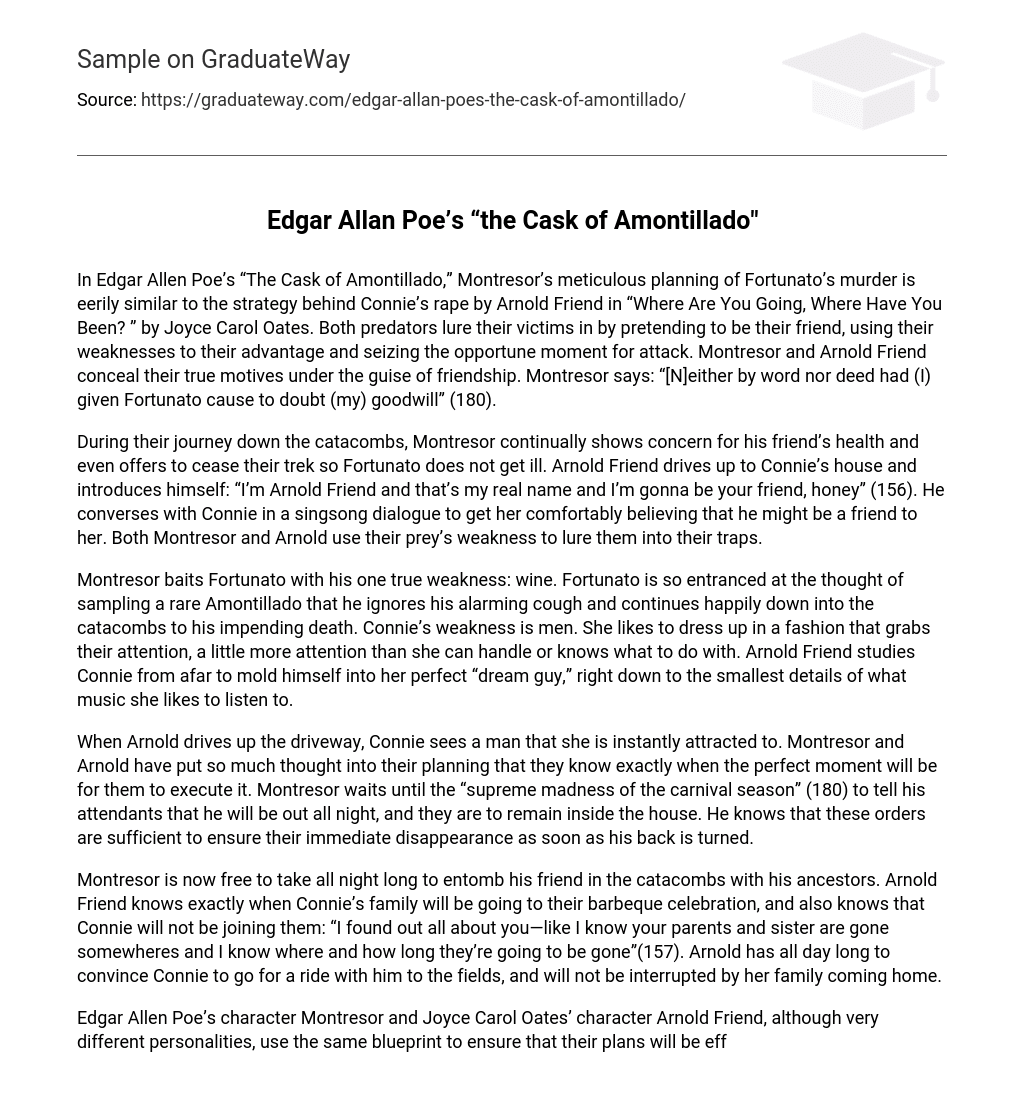Edgar Allen Poe’s “The Cask of Amontillado” and Joyce Carol Oates’ “Where Are You Going, Where Have You Been?” share a disturbing similarity in the calculated tactics employed by the antagonist. Montresor meticulously plans Fortunato’s murder, while Arnold Friend carefully orchestrates Connie’s rape. Both predators masquerade as friends, exploiting their victims’ vulnerabilities and waiting for the perfect moment to strike. Montresor and Arnold Friend deceive their victims by presenting themselves as well-intentioned acquaintances. Montresor emphasizes, “[N]either by word nor deed had (I) given Fortunato cause to doubt (my) goodwill” (180).
Throughout their respective encounters, both Montresor and Arnold Friend exploit the vulnerabilities of their victims, employing deceitful tactics to ensnare them. As Montresor leads his friend down the catacombs, he consistently displays concern for Fortunato’s well-being and offers to halt their expedition, ensuring Fortunato’s good health. Similarly, when Arnold Friend arrives at Connie’s residence, he confidently introduces himself with the statement: “I’m Arnold Friend, and that’s my real name. I’m gonna be your friend, honey” (156). Engaging in a sing-song dialogue, Arnold Friend manipulates Connie into trusting him, using her desire for friendship as a way to allure her into his trap.
Montresor entices Fortunato by offering him his weakness, wine. Despite Fortunato’s cough, he becomes fascinated with the idea of trying a rare Amontillado and proceeds cheerfully towards his imminent death in the catacombs. Conversely, Connie’s weakness lies in men. She enjoys dressing up in outfits that attract their attention, maybe even more attention than she can handle or comprehend. Arnold Friend observes Connie from a distance to transform himself into her ideal “dream guy,” even to the extent of knowing her preferred music.
When Arnold arrives at the driveway, Connie instantly finds herself attracted to him. Montresor and Arnold have meticulously strategized so that they are aware of the precise moment to execute their plan. Montresor chooses the “supreme madness of the carnival season” (180) to inform his attendants that he will be gone all night and instructs them to stay indoors. He is confident that these instructions will ensure their swift disappearance as soon as he departs.
Montresor is now free to spend the entire night burying his friend in the catacombs with his ancestors. On the other hand, Arnold Friend is aware of the exact timing of Connie’s family’s departure for a barbecue celebration. He is also aware that Connie will not be joining them, as he states, “I found out all about you—like I know your parents and sister are gone somewheres and I know where and how long they’re going to be gone” (157). Furthermore, Arnold has the entire day to persuade Connie to go for a ride with him to the fields without any interruptions from her family returning home.
Two literary characters, Montresor from Edgar Allen Poe’s story and Arnold Friend from Joyce Carol Oates’ work, adopt a similar approach in order to successfully execute their plans. Despite their contrasting personalities, they both conduct thorough investigations into their victims’ backgrounds while deceitfully portraying themselves as friendly acquaintances.
In addition, they take precautions to prevent any interruption to their crimes, resulting in a strong belief that their heinous acts will remain hidden forever. These two individuals, Montresor and Arnold Friend, showcase their brilliance as criminal masterminds, offering readers a dire warning about the dangers posed by unfamiliar individuals.





